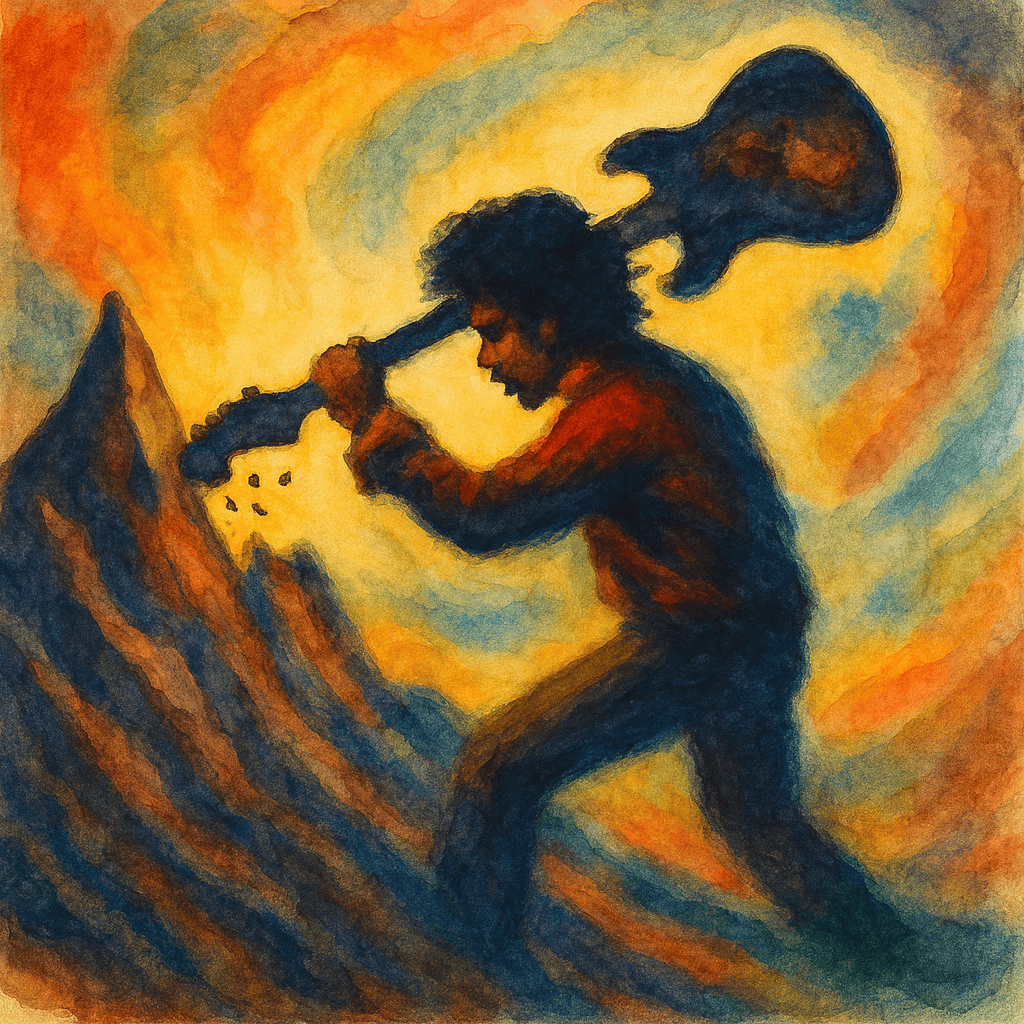Voodoo Child (Slight Return): The Electric Conjure of Jimi Hendrix

I first encountered the music of Jimi Hendrix when I was about ten years old, through the 1994 film Forrest Gump starring Tom Hanks. The movie featured two of Hendrix’s most iconic tracks — “All Along the Watchtower,” originally written by Bob Dylan but transformed by Hendrix into a psychedelic masterpiece, and his fiery rendition of “Hey Joe.”
“All Along the Watchtower” plays during the Vietnam War sequence, as Forrest and his unit are transported by helicopter and later move cautiously through the jungle. The song’s tense, electric atmosphere captures the chaos and disorientation of war, its swirling guitars mirroring the confusion and fear of combat. Later in the film, “Hey Joe” underscores a montage of Jenny’s wandering years — her immersion in the San Francisco counterculture, her involvement with activists, and her descent into drugs and self-destruction.
Both songs carry the unmistakable signature of Hendrix’s genius, yet in Forrest Gump they serve primarily as background for white-centered stories — the turmoil of war and the rebellion of the ’60s filtered through Hendrix’s sound but detached from his presence. His music animates these scenes, but the man himself — a Black artist who redefined rock and embodied nonconformity — remains unseen.
Still, those moments left a deep mark on me. Hearing Hendrix’s guitar for the first time — even filtered through a Hollywood lens — was like hearing the sky tear open. That early exposure sparked a lifelong fascination, leading me back to his full catalogue in high school, and eventually to today’s focus: his blistering, transcendent anthem “Voodoo Child (Slight Return).”
When Jimi Hendrix stepped onto the stage with his Fender Stratocaster and launched into Voodoo Child (Slight Return), it wasn’t just another rock performance—it was an electrified sermon. Released in 1968 on Electric Ladyland, this song became an instant showcase of Hendrix’s unparalleled guitar mastery, his deep connection to the blues, and his ability to push the instrument into previously unimagined territory.
For guitar players, Voodoo Child (Slight Return) is more than a song—it’s a rite of passage. It’s the track you study to learn phrasing, tone control, and how to make a guitar speak, growl, and cry.
While the song feels like hard rock, its foundation is pure blues. Hendrix, deeply rooted in the music of Muddy Waters, B.B. King, and Howlin’ Wolf, takes the 12-bar blues structure and amplifies it—literally—into the psychedelic era. The lyrics carry a boastful, almost mythical swagger, echoing the braggadocio found in classic Delta blues, but reframed through a post–Civil Rights, electric-guitar-wielding Black man’s voice.
For guitarists, Voodoo Child (Slight Return) is a reminder that technical brilliance is nothing without emotional weight. Hendrix didn’t just play notes—he told a story of defiance, identity, and cosmic self-mythology.
To many white listeners, Hendrix was a guitar god, an exotic genius who redefined rock’s sonic possibilities. But to the FBA lineage, he was a griot — an heir to Robert Johnson, Muddy Waters, and Sister Rosetta Tharpe — musicians who used the guitar not just as an instrument, but as a vessel of testimony. The title “Voodoo Child” itself is a declaration of that lineage. It reclaims the word voodoo from colonial distortion — not as black magic, but as Black power, spiritual technology born from West African cosmology, carried through the Middle Passage, and reshaped in the Deep South.
When Hendrix steps to the mic and says, “Well, I stand up next to a mountain / and I chop it down with the edge of my hand,” he’s not just indulging in psychedelic bravado. He’s resurrecting the Black heroic voice — the same archetype that lived in John Henry, Stagger Lee, and the trickster figures of the blues. This is the sound of a man defining himself against the scale of the world. Hendrix doesn’t ask for permission; he reshapes the mountain by force of spirit.
In the FBA lineage, that “mountain” is more than geological — it’s the weight of white supremacy, war, and cultural confinement. The “edge of my hand” becomes both guitar pick and weapon, symbolizing the transformation of labor into art, the same way enslaved Africans turned work songs into spirituals.
Hendrix goes on to sing in the song:
“Cause I’m a voodoo child, Lord knows I’m a voodoo child.”
Here, Hendrix makes his declaration of identity. To many, “voodoo” meant superstition or fear; to the FBA ear, it’s a word reclaimed. It references the ancestral technology of survival — African spiritual systems that endured in Louisiana, Haiti, and the Gullah coast. Hendrix aligns himself with that lineage. He is not a “child” of the Western world, but of the voodoo, of the hidden knowledge passed down through sound and spirit. This refrain also carries blues structure — a repeated line, invoking trance. He chants it, not sings it, calling forth power the way a conjure man would repeat a spell.
Next Hendrix sings:
“I didn't mean to take up all your sweet time/I'll give it right back to ya one of this days”
At first this sounds like classic blues apology, the lover’s farewell — but underneath is a coded spiritual duality. Time here is not just romantic; it’s cosmic. Hendrix is talking to humanity, to his audience, to his generation. He’s aware of his brief existence (“one of these days”), foreshadowing his early death at 27. This line reads like a promise of resurrection — a prophecy that his spirit and sound will return, echoing through every amp that distorts in his wake.
In the blues tradition, death is never final; it’s a doorway. The root of the word voodoo (from the Fon vodu) literally means spirit. Hendrix knew he was channeling something that could not die.
In the last main verse Hendrix sings:
“If I don’t meet you no more in this world / Then I’ll meet you in the next one, and don’t be late.”
This is the heart of the song’s gospel. Hendrix fuses the reincarnation ideas of African cosmology with the eschatology of Black church spirituality. “The next world” is both afterlife and after-legacy — the next generation of Black musicians who will carry his torch. The line’s tone is casual, but the message is profound: Hendrix is saying he will transcend time and form, his sound eternal. For FBA culture, that’s the same faith that animated spirituals — a certainty that freedom, if not found on this earth, awaits in another realm. Musically, this moment mirrors that transcendence: he punctuates the lyric with soaring bends, sliding between notes like a spirit leaving the body.
“Voodoo Child (Slight Return)” is not simply a psychedelic blues-rock anthem; it’s a declaration of Black divinity. Hendrix turns the electric guitar into a mojo hand, blurring the line between art and ritual. His playing doesn’t just entertain — it sanctifies. The song, from an FBA perspective, is a moment where Black sound rewrites American mythology, placing the Black musician as prophet and creator, not imitator.
For Foundational Black Americans, Hendrix’s Voodoo Child (Slight Return) stands as both spell and scripture — the moment when the blues was resurrected through voltage and vision. It taught the world that our music is not bound by genre or geography; it’s living spirit. And like Hendrix promised, if we don’t meet him in this world, we’ll meet him in the next — every time that first wah-wah cry pierces the air. Every guitarist who picks up a Stratocaster since has, in some way, answered that call.

